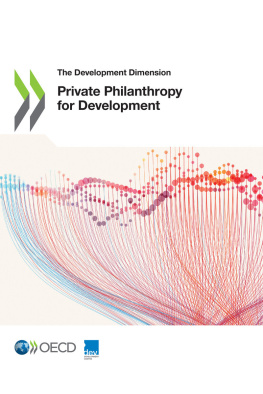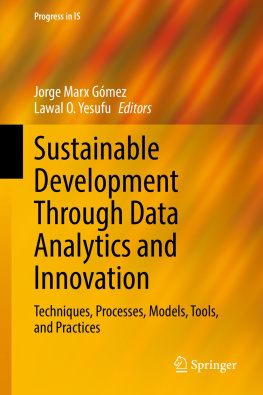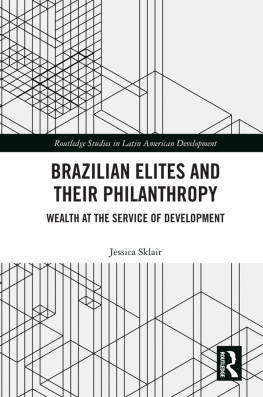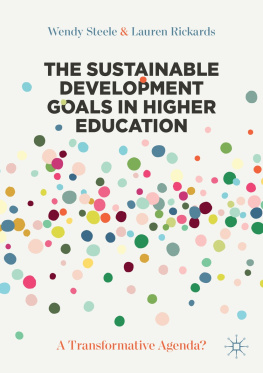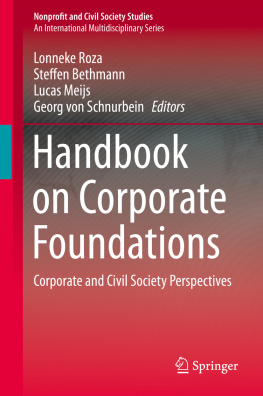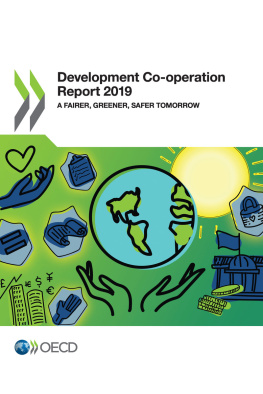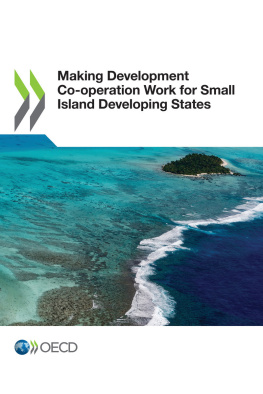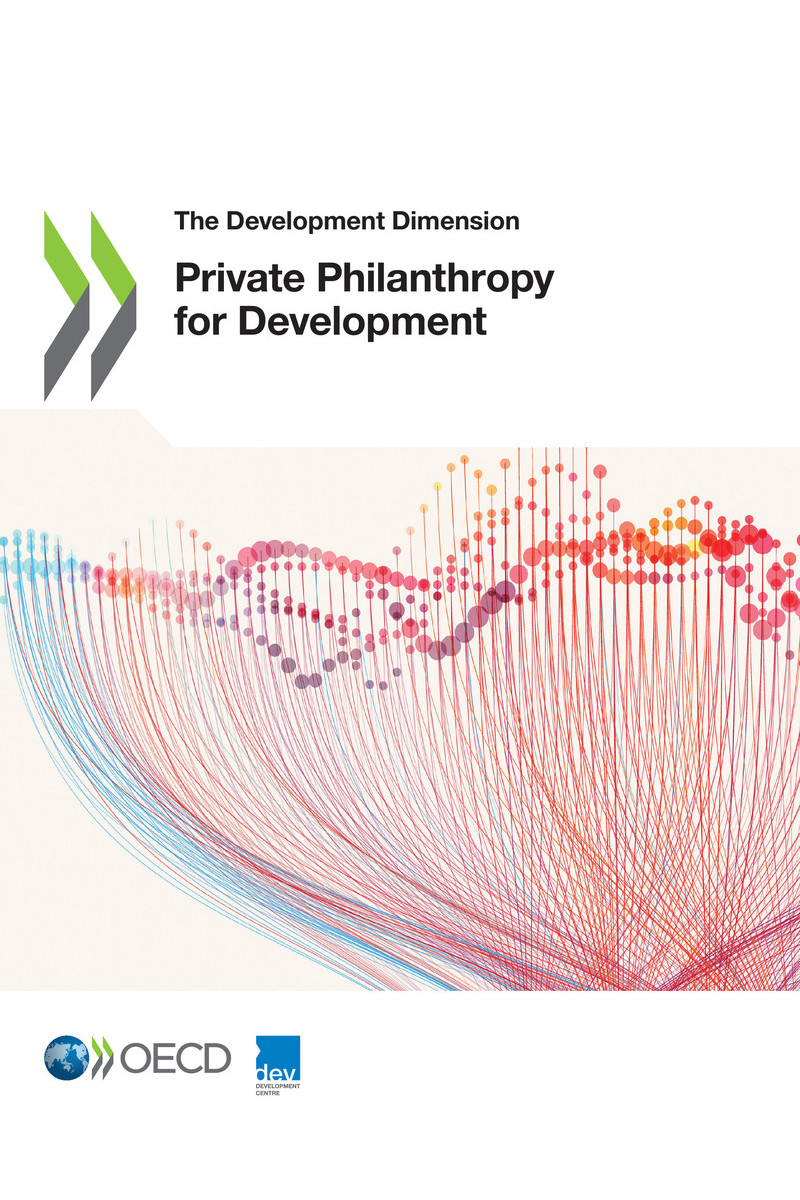The Development Dimension
Private Philanthropy for Development
Please cite this publication as:
OECD (2018), Private Philanthropy for Development , The Development Dimension, OECD Publishing, Paris.
https://doi.org/10.1787/9789264085190-en
Metadata, Legal and Rights
ISBN: 978-92-64-08517-6 (print) - 978-92-64-08519-0 (pdf) - 978-92-64-30016-3 (HTML) - 978-92-64-30015-6 (epub)
DOI: https://doi.org/10.1787/9789264085190-en
Series: The Development Dimension
ISSN: 1990-1380 (print) - 1990-1372 (online)
This work is published under the responsibility of the Secretary-General of the OECD. The opinions expressed and arguments employed herein do not necessarily reflect the official views of OECD member countries.
This document, as well as any data and any map included herein, are without prejudice to the status of or sovereignty over any territory, to the delimitation of international frontiers and boundaries and to the name of any territory, city or area.
The statistical data for Israel are supplied by and under the responsibility of the relevant Israeli authorities. The use of such data by the OECD is without prejudice to the status of the Golan Heights, East Jerusalem and Israeli settlements in the West Bank under the terms of international law.
Revised version, May 2018
Details of revisions available at: http://www.oecd.org/about/publishing/Corrigendum_Private-Philanthropy-for-Development.pdf
Photo credits: Cover Garrykillian | Dreamstime.com
Corrigenda to OECD publications may be found on line at: www.oecd.org/publishing/corrigenda .
OECD 2018
You can copy, download or print OECD content for your own use, and you can include excerpts from OECD publications, databases and multimedia products in your own documents, presentations, blogs, websites and teaching materials, provided that suitable acknowledgement of OECD as source and copyright owner is given. All requests for public or commercial use and translation rights should be submitted to .
Foreword
Dear Friends
Consider philanthropy in action from the combined giving of USD 14.7 billion in 2017 by the top 50 donors, to funding a new malaria vaccine, or to opening schools that give girls access to a quality education. These and many other examples of philanthropys role in advancing sustainable development attract a great deal of attention. But how can we optimise its role in support of the 2030 Agenda for Sustainable Development? By contributing both financial resources and innovative approaches, foundations demonstrate their potential to influence and impact social and economic development worldwide. As the ambitious priorities of the Sustainable Development Goals come face-to-face with limited economic resources exacerbated by the 2007 financial crisis, the time is ripe to harness the promise of philanthropy. The first step towards assessing philanthropys role is having reliable evidence at hand. In this context, the ground-breaking survey at the heart of this report captures previously non-existent global and comparable data of how much and in what ways foundations support development. These data and qualitative evidence allow action-oriented recommendations to optimise philanthropys role in support of sustainable development.
Indeed, by unpacking information on philanthropic resource flows for development purposes, priorities, implementation channels and relationships with other actors, we challenge expectations and call into question long-held assumptions. First, we have a clearer perspective on philanthropys scale as an emerging and powerful slice of the financing for development pie. Philanthropic flows are still modest in volume compared to official development assistance (ODA) accounting for 5% but in such key sectors as health, they appear to be significant players, as the third largest provider. Second, we now have a deeper understanding of where foundations primarily spend their resources. Philanthropists favour investing in stable, middle-income economies and through large, established partners, such as international organisations and non-governmental organisations. And, third, we recognise just how much philanthropies value partnerships and the potential they still have to further engage in coalitions with governments, donors, social entrepreneurs and civil society organisations. The data refute the stereotype that foundations always shy away from working with other development partners at the country level. In fact, most of the foundations interviewed in the survey say that they systematically engage with governments and donors 67% and 45%, respectively when designing or implementing their programmes and projects.
This sampling of the reports findings resulted from our close co-operation and our expertise on philanthropy for development. On the one hand, the OECD Development Centre is home to the Network of Foundations Working for Development (netFWD). As a platform for dialogue, netFWD has produced practical guidance highlighting foundations comparative advantages in the wider public discourse on sustainable development. On the other hand, the OECD Development Co-operation Directorate (DCD) has unparalleled experience setting statistical standards and collecting data on resource flows to developing countries, particularly ODA, as the secretariat for the Development Assistance Committee. The survey carried out for this report is one concrete outcome of DCDs efforts in recent years to enhance its statistics on development finance beyond official assistance. Indeed, official providers increasingly view foundations as key partners who can leverage and optimise their limited resources. This report adds to that knowledge and offers fresh perspectives and new evidence on the opportunities and considerations of greater engagement by foundations in development.
We believe this report is of practical value to government policy makers as well as decision makers in civil society organisations, social enterprises and foundations. It is a comprehensive study to inform policies and strategies to engage philanthropy in delivering meaningful and sustained development outcomes. We invite you to explore and fully use this resource for that worthy purpose.
Sincerely,
Mario Pezzini, Director, OECD Development Centre, Special Advisor on Development to the OECD Secretary-General | Jorge Moreira da Silva, Director, OECD Development Co-operation Directorate |
Acknowledgements
This report was prepared jointly by the OECD Development Centre (DEV) and the OECD Development Co-operation Directorate (DCD) under Mario Pezzini, Director and Special Advisor to the OECD Secretary General on Development, DEV and Jorge Moreira da Silva, Director, DCD.
The report was written under the guidance of Bathylle Missika, Head of the Partnerships and Networks Unit and Senior Counsellor to the Director (a.i) and co-ordinated by Ewelina Oblacewicz, Co-ordinator of netFWD, DEV, together with Tom Hos, Research Officer, Financing for Sustainable Development Division, DCD, with guidance from Lorenzo Pavone, Deputy Head, Partnerships and Networks Unit, Ccile Sangar, Development Finance Analyst, Financing for Sustainable Development Division, DCD and Julia Benn, Head of Unit, Financing for Sustainable Development Division, DCD. It benefitted from strategic inputs from Haje Schtte, Head of the Financing for Sustainable Development Division, DCD.

